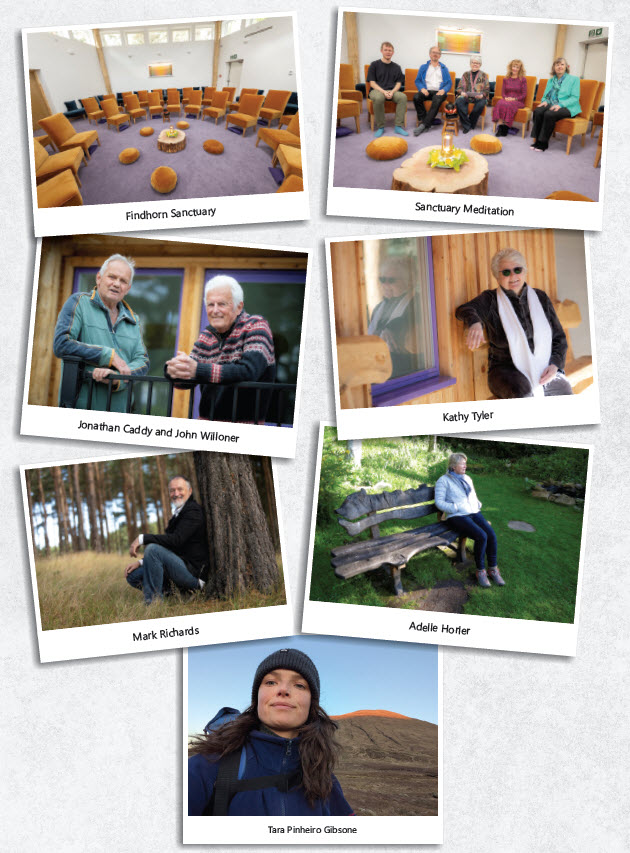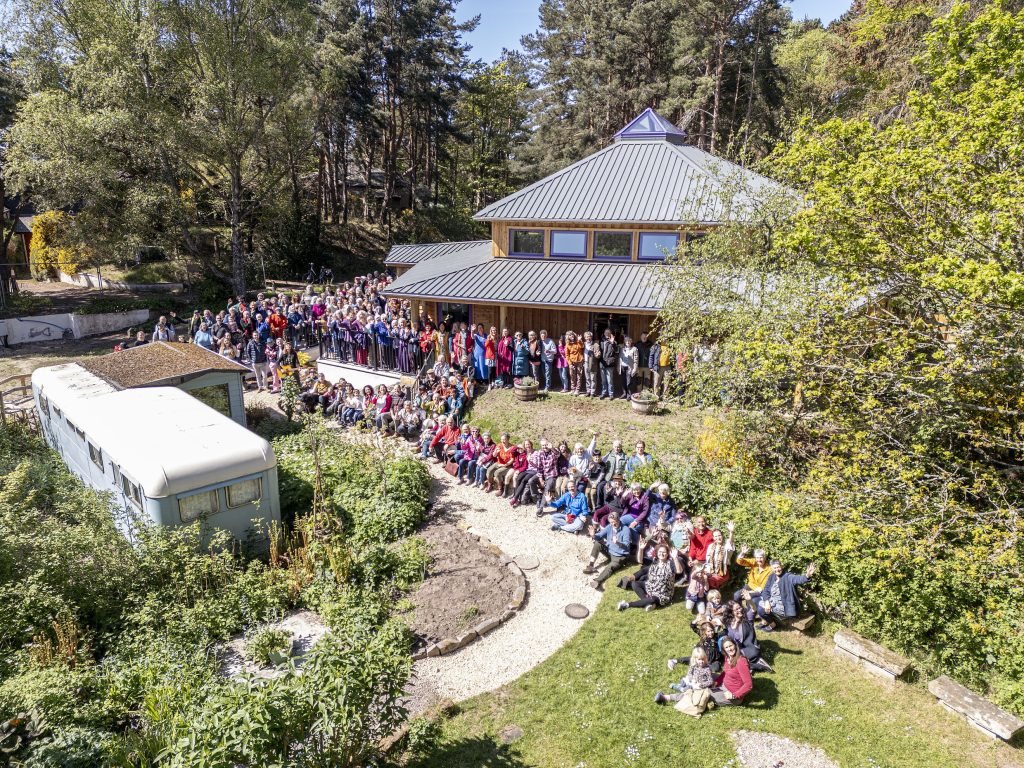LOOKING FORWARD FINDHORN
By Geoff Dalglish, Odyssey’s pilgrim-at-large
The celebrated Findhorn spiritual community in northeast Scotland is rising Phoenix-like in the devastating aftermath of Covid, Brexit, an arson attack, massive job losses and near financial collapse.
Battered by its recent painful past, it is preparing a determined response to offer fresh hope in a rapidly changing world that’s navigating a great disconnect from the healing intelligence of the natural world. From Mother Earth, our first mother, herself.
Centered in what is now known as Park Ecovillage Findhorn, adjoining the iconic centuries-old former Findhorn fishing village and an historically and ecologically important dune field alongside the North Sea, it is physically small and outwardly seemingly insignificant. But its messages and pioneering example have touched thousands and perhaps millions of lives over the past 60-plus years.
Described variously as a mystery school, a laboratory for change, a hothouse for spirituality, or simply the ‘Findhorn experiment’, it was and is a quest to explore ways of living that are kinder to the Earth, to each other, and to all beings seen and unseen.
“It’s so sad Findhorn has closed down,” several people suggested to me in the wake of some misleading headlines. An announcement in 2023 implied that the Findhorn Foundation was closing. The reality is that the Foundation, which is not The Community but a part of it and is but one of more than 40 local organisations, was facing financial collapse and radically downsizing and reimagining itself.
Before Covid, it had about 125 staff and volunteers like me. Suddenly there were no guests which were the charity’s financial lifeblood. I was one of seven in the Guest Department and we quietly and sorrowfully disbanded ourselves.
One of the Foundation staff who lost both his job and home didn’t take the changes so calmly. In the small hours of the night, he torched the Community Centre and Sanctuary, striking a blow at the social and spiritual heart of the community. Luckily there was no loss of life.
I was at the opposite end of the world and watched on my computer screen as firefighters battled the blaze. Believing that there’s a perfection to all that happens in life, I pondered what perfection might emerge from this seemingly disastrous night. I imagined it might create true community by bringing everyone together, replacing the smallminded ‘them and us’ mentality that often separated the Foundation from those around it. Happily, that has partially happened.
On Easter Sunday 2025 in a powerful moment of renewal, the magnificent new Light of Findhorn Sanctuary opened with a beautiful meditation led by project manager and community elder Kathy Tyler. It was a joyful blessing and celebration, the sacred space literally rising from the ashes of the original sanctuary lost to the fire of 2021.
In a wonderful synchronicity Kathy Tyler also noticed that the image on co-founder Eileen Caddy’s popular Daily Guidance calendar for Easter Sunday is of the original sanctuary. Eileen had faithfully recorded the daily guidance she received from what she described as ‘the small still voice within,’ which she took to be the voice of God. The accompanying message is, “Go into the silence and feel peace and serenity enfold you. In that state of perfect peace, ask and receive My blessing. Then go forward in absolute faith and do what has to be done.”
Now that guidance echoes again with the new sanctuary’s birth.
Linking the two visually different spaces, Kathy read aloud Eileen’s guidance from Easter Sunday of 1968, “The Sanctuary is now, and always shall be, a tremendous powerhouse, where power will be generated out to the four corners of the earth. It will become known all over the world and many will be drawn to it and find great strength and help from the power and radiations which emanate from it. They will find peace and love, light and wisdom, as well as great joy and happiness, from simply being in there. Many problems will be solved as they sit in complete silence, find Me in the midst of them, and come to know Me and Love Me and do My will. My full blessings are upon My Sanctuary, My Ark of the Covenant. Let it be treated as a sacred and consecrated place, where all may find their true selves.”
Today this striking pentagonal building is a symbol of faith, hope and renewal, the outcome of a major fundraiser and thousands of hours of work by many who lovingly crafted the mostly locally sourced materials. Interestingly it is Jason Caddy, the grandson of community co-founders Peter and Eileen Caddy, whose company was responsible for the design and construction.
Jonathan Caddy, son of the co-founders, is a witness to all the chapters that have unfolded in the Findhorn story. “I’ve been in this privileged position of being here from the very first day on the 17th November 1962. The new sanctuary connects so much more with the Original Garden, and it looks right onto the caravan, and that’s the caravan I was born in. For me it’s the juxtaposition between the legacy and the transformative nature of the place.”
While the old sanctuary served for 53 years, it was a double garage bought for £1 000 in 1968, reroofed a couple of times, and had various things done to it over the years. “Now we have something wonderful to replace it.
“I’ve been a witness to change, transformation and the amazing power of this place. And the world came to my doorstep. It’s been crazy and amazing at the same time. It’s a wonderful story, starting from really simple beginnings. Dorothy (Maclean), Mom and Dad, and Lena (Lamont), came here to simply follow that inner calling, whatever we call it, Spirit, the God within, in our daily lives. And put that first. How can we do that as individuals and what is the result of that? That’s the simple experiment that happened here. Part of that inner listening was listening to the natural world. The garden was important to us as well. Out of this tiny seed so much has come.
“And it’s not about creating Utopia here in the northeast of Scotland. How can we in our own way help with positive change in the world?”
Against the backdrop of climate change and the identity crisis Ecovillage Findhorn and other communities are facing, searching questions are being asked about relevance. Findhorn is still vital and viable, Jonathan says, although “We’re being forced to change, which is great. We’re being forced to transform. And transformation is different than change because we’re going somewhere where we don’t know what the end point is. Change can be incremental, but transformation is something new that you go into. It’s been needed for many years.
“We are in a fluid state which is full of opportunities, and the main thing is to grab those while we can. We’ve been talking about change for probably the past decade and a half. Now is the opportunity to make that change.”
Adelle Horler, a journalist, editor and content creator who birthed the website Visit Ecovillage Findhorn, says, “From my first visit to Findhorn 10 years ago I felt this was a place of accelerated personal change. I had a moment of certainty that once I stepped onto this path of spiritual growth there’d be no turning back. And that’s been true.
“There’s certainly an energy field here – who knows whether that’s the accumulated effect of the community practising deep kindness here for over 60 years, or it’s somehow deeper and more elemental, part of the land itself.
“I know that it’s affecting. It’s a real privilege to live in a place that’s not only absolutely beautiful, it’s also where spiritual practice and eco-consciousness are an accepted part of the fabric of daily life.
“While the ‘practice’ itself is diverse – from a variety of religions to mindfulness and meditation, to dance and singing, to conscious nature connection – there are commonalities that tie the community together.
Most gatherings, whether it’s a work party in the garden, a business meeting or a community election, start with an attunement – a pause where we release what’s gone before to connect with each other, align with spirit (whatever we may call it individually), and focus on the task ahead.
“There are also three practices that were developed by our founders, which still resonate with and guide most of us today: inner listening, co-creation with the intelligence of nature, and work being an expression of love in action. There’s also Common Ground, a kind of manifesto of agreements for living in community. Which get invoked some of the time.
“Another privilege, and for me a real joy as one of the facilitators here, is to watch the effect this place has on visitors coming to share a workshop. A group of disparate strangers arrives, often unsure of what to expect, and slowly over a few days they bond into a tight group, gradually feeling safe enough to share and release things holding them back. For many it’s a profound turning point.
“So, it’s a place of transformation, and it has undergone painful and traumatic transformation itself over the past five years.
“And now it’s transforming again. The profound changes at the Findhorn Foundation have created a perception that the ecovillage has closed down. No, we’re not closed – as the 400 or so residents will tell you, as well as the 40-odd enterprises, organisations and charities that continue to thrive.
“There’s a subtle shift being felt by many. A quietly growing sense of aliveness, that we may be starting to emerge from an uncertain few years. A move to create a formal community education structure is in development, and we have a Sanctuary again! While challenges around our evolution continue, having a beautiful spiritual centrepoint is a thriving and joyful step. As Eileen Caddy would say, ‘All is very, very well.’”
Community photographer Mark Richards observes, “There seems a positively palpable bubbling up of energy and new spirit. Many more young folk are engaging with ideas for events, ceremonies, concerts, dances, get togethers. The community feels like it has a real sense of coming together in the Spring warmth and expanding into its potential. Watch this space!”
Tara Pinheiro Gibsone was born in one of the iconic whisky barrel homes in 1994, grew up in the community, and continues to be actively involved in projects rooted in the area. She currently works as a project coordinator on a Horizon Europe research grant, supporting community approaches to renewable energy integration. She has contributed to a range of initiatives focused on nature-based social inclusion, education, and environmental action. Meditation and the exploration of human consciousness remain central threads in her life, bringing depth to her outward engagement in the world.
“Findhorn has been going through another major transition, a shift in identity, structure, and being, she says. “While much has changed, the path it has forged remains very relevant to the world. It continues to be a longstanding example and experiment in doing things differently: living consciously and collaboratively with each other and with nature.
“Rather than a tightly defined community, it is increasingly stepping into its role as a village. Despite recent challenges it remains a place where individuals continue to live, grow, and explore new ways of being and creating together.
“From land stewardship and renewable energy systems to affordable housing, green building, and cooperative governance, Findhorn continues to offer tangible, practical models that speak to the global need for transition. While the community faces real challenges — an ageing population, fewer visiting guests, and a quieter programme calendar than in the past — a growing number of young families and children are bringing fresh energy to the area. And the broader Findhorn region, influenced in part by the community’s values and presence, feels dynamic and alive.
“I was moved when I first stepped into the new Sanctuary. Coming together in silence has been a core part of the community from the beginning. Losing the original sanctuary in the fires was a real fracture, one that was compounded by the pandemic and the loss of the Community Centre. To sit together again in silence, to settle our minds and tend to the heart, feels both healing and vital.”
The community website, www.visitecovillagefindhorn.uk, lists a full calendar of workshops, as well as how to visit – it’s worth signing up to the mailing list to keep up with happenings



